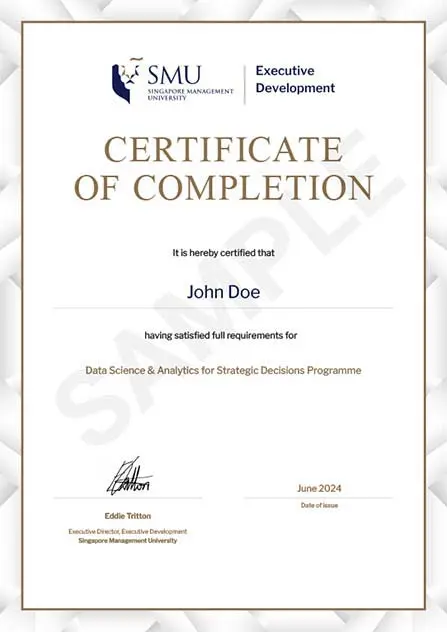
Integrated with AI
Data Science & Analytics for Strategic Decisions Programme
- Live Session with Faculty Experts
- Live Session with Industry Leaders
- Masterclasses on AI and Gen AI
- Hands-on Capstone Project
Round Deadline: Invalid liquid data
Programme Overview
In today's business landscape, data is not just an asset — it is a strategic advantage. With global data volumes projected to reach over 180 zettabytes by 2025 (Source: Statista, 2024), organisations are racing to harness meaningful insights that drive smarter, faster, and more impactful decisions.
Yet, a major challenge remains: nearly 80% of business data is unstructured (IDC, 2024), making it difficult to extract strategic value without the right skills and tools. This creates a growing demand for professionals who can bridge the gap between complex data and actionable business strategies.
The Data Science & Analytics for Strategic Decisions Programme offered by Singapore Management University is designed to help you understand the art of processing and interpreting data. This enables you to make more effective and intelligent decisions within your organization. Additionally, you’ll discover how AI elevates data science, unlocking valuable insights and empowering smarter business strategies.
36%
70%
95%
Strategic Decisions Powered by Data: Master Analytics, AI & Experiments with SMU
Join Prof. Michelle Cheong as she gives you an exclusive tour of this programme. Learn to apply analytics, machine learning, and experimental design to drive growth and gain a sustainable competitive edge.

Drive Strategic Impact with Data Science & Analytics Expertise from SMU Faculty

Live Masterclasses on AI & Gen AI

AI-Powered Data Storytelling and Decision Intelligence

AI Ethics, Bias, and Responsible Data Science

Web Scraping with AI for Data Automation

Generative AI for Business Analytics

AI-Driven Predictive Analytics and Forecasting in Business
The Singapore Management University Advantage
#2
#2
#3
Who Is This Programme For?
Mid-to-senior Professionals from both Tech and Non-tech backgrounds looking to transition into data-driven leadership roles — no coding required; basic Excel knowledge is helpful
Leaders and Managers across industries like IT, E-Commerce, Finance, Marketing, Banking, Education, and Consulting who want to drive strategic decisions using data
Professionals in Functions such as Engineering, Technology, Marketing, Finance, Operations, and HR aiming to build predictive models and improve business outcomes
Aspiring Data-centric Leaders who want to own critical business functions, unlock insights, and drive sustainable growth through analytics and strategic thinking
Programme Highlights

Pre-recorded video lectures* by SMU faculty

Industry examples for practical exposure

Case studies for real-world application

Masterclasses with industry professionals

Hands-on assignments** for applied learning

Discussion boards for peer interaction

Live sessions with SMU faculty experts

Live sessions on XLSTAT for tool-based learning
Note:
The programme highlights presented above are approximate, and subject to change depending on the availability and expertise of the teaching faculty, as well as the programme's desired outcomes.
*This is a majorly self-paced online programme with some live sessions with programme faculty. Post- session video recordings will be available for up to 12 months after programme completion. We have a curated panel of industry practitioners who will be conducting the weekly live doubt-clearing sessions.
**Assignments are reviewed either by success coach who is available to support participants in their learning journey and/or by the Emeritus grading team. The final number of quizzes, assignments and discussions will be confirmed closer to the programme start.
Programme Modules
Key terminologies of data science
Different levels of data analytics and their significance to decision-making
Data features and insights to attain sustainable competitive advantage
Applications of data analytics and its role in creating new business opportunities
Analytical approach to resolve a business problem
Is your organisation is data-driven
Trends in data and obtaining related insights to enhance business performance
Impact an organisation’s omnichannel strategies have on sales
How to identify appropriate data/insights
Comparison of independent data sets to obtain insights
How to apply strategic decision-making using said techniques
Regression to analyse the strength/impact of variables
Predict variable impact using optimal model fit and regression effects
Logistic regression model to test and predict expected outcomes
Apply predictive analytics to organisational events to advance strengths and counter threats
Correlation and causality and their significance to enhancing business performance
Experimentation for business problems to make effective inferences
Multivariate, A/B and Multi-Armed Bandit testing
Effectiveness of using experimental design to make data-informed recommendations for business growth
Recommendation Systems
Recommendations and Ranking
Collaborative Filtering
Personalized Recommendations
ML and its role in driving organisational productivity
Apply ML algorithms to achieve optimal analytical accuracy
Programme-building facets of neural networks and deep learning
Combine analytics with experiments to produce effective business strategies
Decision Making Under Uncertainty
Bayesian Decision Making
Simulations to make decisions under uncertainty
Optimal Decision Making
Linear Optimisation
Sensitivity Analysis and Shadow Price
Driving digital transformation within the organisation
Change management: The role of data analytics, machine learning and its applications
Aligning organisations and teams for data-driven approaches
Making the business case for Data Science
Data Storytelling with Visualisation using Tableau
Disruptive innovation
Distilling value from analytics
Developing a strategy roadmap, privacy implications, traps and myths
Customer-centric analytics in retail and media
Business process analytics
Domain exposure
Key challenges to data science projects and their solutions
Delta Framework and Delta Plus Model
Project-level risks and examples of failed data science projects
Predict the success of big data project using DATA technique
Drivers, expected outcomes, and technology enablers for Industry 4.0
Components for AI success
Challenges in the implementation of AI in systems
Evaluate an organisation’s digital transformation journey and sustain a competitive advantage
Overview of ChatGPT and OpenAI
Timeline of NLP and Generative AI
Frameworks for understanding ChatGPT and Generative AI
Implications for work, business, and education
Business roles to leverage ChatGPT
Futureproofing organisations to incorporate Generative AI into workflow
Prompt engineering for fine-tuning outputs
Safeguards and risk mitigation measures
Capstone Project
Apply predictive analytics using logistic regression to optimise organisational efficiency
Analyze loan application data to uncover approval patterns and identify key risk factors. Apply exploratory data analysis, handle missing values, and outline the steps to build a logistic regression model. Strengthen your ability to extract insights and support smarter business decisions through data.
Programme Faculty

Associate Professor of Marketing
Sandeep serves as Associate Professor of Marketing. Prior to joining SMU, Sandeep worked at 3M and before that he worked as a Jr Faculty Fellow at the Indiana University’s Kel...

Professor of Information Systems (Education); Associate Dean, SCIS Post-Graduate Professional Education; Director, Doctor of Engineering
Professor Cheong has served a variety of academic appointments at SMU since 2005, including as a Lecturer, Assistant Professor and Associate Professor of Information Systems. ...

Full-time Faculty, Associate Professor of Computer Science; Director, BSc (Computer Science) Programme; Lee Kong Chian Fellow
Hady W. LAUW serves as Associate Professor of Computer Science at the School of Computing and Information System of Singapore Management University (SMU). His research group P...

Full-time Faculty, College of Integrative Studies, Professor of Communication & Technology, Vice President, Partnerships and Engagement
Sun Sun Lim serves as Vice President, Partnerships and Engagement at the Singapore Management University where she’s concurrently working as Professor of Communication and Tec...
Learning Outcomes
Create and implement business strategies leveraging data science.
Make data-driven decisions to solve business problems using data insights.
Demonstrate how analytics can be combined with experiments to make data-informed recommendations for business growth.
Explain the key challenges and risks in data science projects.
Evaluate an organisation’s data strategy and recommend ways to achieve a sustainable competitive advantage.
Analyse organisational needs and drive business improvement through data science future trends.
Testimonials
Past participants of Emeritus work at

Note: All brand, product and company names are trademarks™ or registered® trademarks of their respective holders. Use of them does not imply any affiliation with, endorsement by, or association of any kind between them and programme owners.

Certificate
Upon successful completion of the programme, participants will be awarded a verified digital certificate by Singapore Management University.
All certificate images are for illustrative purposes only and may be subject to change at the discretion of Singapore Management University.
The Learning Experience
What is it like to learn with the learning collaborator, Emeritus?
More than 300,000 professionals globally, across 200 countries, have chosen to advance their skills with Emeritus and its educational learning partners. In fact, 90 percent of the respondents of a recent survey across all our programs said that their learning outcomes were met or exceeded. All the contents of the course would be made available to students at the commencement of the course. However, to ensure the program delivers the desired learning outcomes, the students may appoint Emeritus to manage the delivery of the program in a cohort-based manner during the course period the cost of which is already included in the overall Course fee of the course.
A dedicated program support team is available 7 days a week to answer questions about the learning platform, technical issues, or anything else that may affect your learning experience.
Emeritus Career Services
Stepping into a business leadership career requires a variety of job-ready skills. Below given services are provided by Emeritus, our learning collaborator for this program. The primary goal is to give you the skills needed to succeed in your career; however, job placement is not guaranteed.
Emeritus provides the following career preparation services:
Resume building videos
Interview preparation videos
Linkedln profile building videos
Interview guidebooks
Glossary of resume templates
Please note:
SMU or Emeritus do not promise or guarantee a job or progression in your current job. Career Services is only offered as a service that empowers you to manage your career proactively. The Career Services mentioned here are offered by Emeritus. SMU is not involved in any way and makes no commitments regarding the Career Services mentioned here
FAQs
Yes, this 15-week online programme from SMU is designed to help professionals apply data science techniques to real-world business challenges. With modules on machine learning, predictive analytics, and strategic applications, participants gain both theoretical insight and practical exposure.
This data analytics course is specifically designed for both technical and non-technical professionals—no coding required. It emphasizes tool-based learning (Tableau, Excel, XLSTAT), strategic decision-making, and experimentation, making it accessible and career-relevant for diverse learners.
While it stands out among data analytics courses in Singapore, this SMU programme is designed for professionals across the globe. It offers a strategic, application-oriented curriculum with live faculty and industry expert sessions, hands-on learning with tools like Tableau and XLSTAT, a capstone project, and AI-focused masterclasses—making it ideal for global professionals seeking data-driven decision-making expertise.
Absolutely. As a practical data science course, it equips learners with skills in AI-powered storytelling, predictive modeling, risk evaluation, and future trends in data science—making it ideal for business managers aiming to lead data-driven strategies.
Yes. Participants who successfully complete the course and the capstone project will receive a verified data analytics certificate from Singapore Management University, recognized across industries and roles.
Yes, this is a fully flexible online data science course with 4–6 hours of commitment per week. Learners benefit from live weekend sessions, case studies, hands-on assignments, and interactive tools—all structured for professionals balancing full-time work.
While a typical business analytics course may focus narrowly on reporting and dashboards, this programme goes further by covering data strategy, experimentation, machine learning, and AI integration—all tied to strategic business decisions.
Yes. Whether you're in marketing, operations, finance, or HR, the programme helps you learn data analytics in a business context. It empowers you to make informed decisions and lead data-focused transformation within your organization.
Indeed. This course blends data science and analytics concepts through modules like predictive analytics, causality, data innovation, and ChatGPT applications, enabling learners to transition into analytics-driven roles with confidence.
One of the final modules focuses specifically on addressing key challenges and risks in data science projects—including ethics, data bias, implementation hurdles, and governance—preparing participants to manage projects responsibly and sustainably.
Early registrations are encouraged. Seats fill up quickly!
Flexible payment options available.
Starts On




























